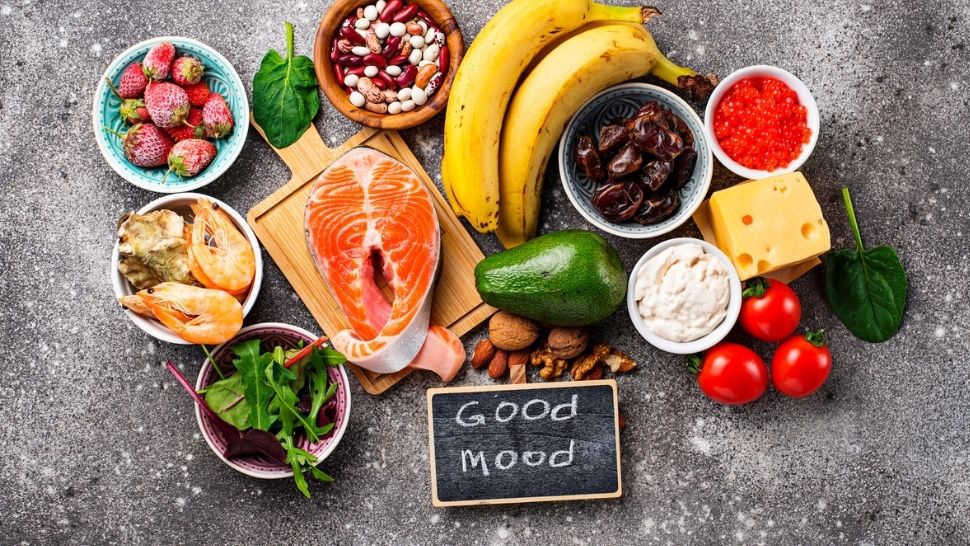
Feeling down? You are not alone. According to the National Institute of Mental Health, 1 in 5 adults in the U.S. suffer from some type of mental illness each year, ranging from mild anxiety or depression to other mental health disorders.
While many lifestyle behaviors play a role in determining your mood, one of the most important factors is how – and what – you eat. Food not only fuels your body, but research shows that your eating habits affect your brain function as well. Food for thought…literally!
Here are seven research-backed eating habits to improve your mood with food:
Eat regularly
Eating regular meals helps to keep your blood sugar stable and your digestive system moving. When you go too long between meals your blood sugar level drops, which can lead to feeling run down and irritable. On the other hand, eating high sugar and high fat foods can leave you sluggish and uncomfortable. The trick is to find the balance between the two.
Consuming balanced meals and snacks frequently helps to stabilize your blood sugar. Choose a combination of lean proteins, healthy fats, and complex carbohydrates for each meal and snack, and space out your meals for a smooth mood (and blood sugar level) throughout the day.
Quick tip: Check out our tips for building balanced meals and snacks on the go
Stay hydrated
In addition to eating regular meals, it is important to properly hydrate throughout the day to improve cognition and keep your digestive system moving. Dehydration can lead to feelings of fatigue and low energy, so drinking plenty of water – and avoiding high salt and sugar food and drinks, as well as too much caffeine – is key to keeping your mind and body fresh.
Quick tip: Get our list of best and worst foods for hydration
Eat a variety of fruits and vegetables
Fruits and vegetables are not only packed with nutrients, but they can also help boost your mood. Studies have shown that people who eat a diet rich in fruits and vegetables are more likely to report higher levels of happiness than those who don’t. In addition to providing vitamins and minerals, meals with lots of colorful fruits and vegetables provide fiber to improve digestion and antioxidants, many of which play a role in the creation of happiness hormones like serotonin and dopamine.
Quick tip: Here’s how to include more fruits and vegetables in your diet
Power up with protein
Protein provides the building blocks for the chemicals in your brain that regulate your mood. Eating a little protein with meals and snacks can help you feel fuller for longer and keep your energy levels up. Good sources of protein include plant-based options like beans, lentils, soybeans, nuts, and seeds, as well as lean meats, fish, eggs, and cheese.
Quick tip: Power up your meals with these plant-based proteins
Balance the right fats
Fat matters – both the healthy fats your body (and brain) need and the fats you should consume in small amounts. Your brain needs fatty acids, such as omega-3 and omega-6, to keep it running at its best. But on the other hand, extremely high fat foods have been shown to be detrimental to your physical and mental health.
Rather than avoiding fats altogether, focus on eating healthy sources of fat such as oily fish, poultry, nuts (especially walnuts and almonds), olive and sunflower oils, seeds (such as sunflower and pumpkin), and avocados.
Quick tip: Get the lowdown on dietary fats
Limit caffeine intake
Caffeine is a stimulant that can give you a quick burst of energy, but consuming too much may lead to some people feeling anxious or depressed. Food and drinks containing caffeine are also known to disturb sleep and may cause withdrawal symptoms when you stop consuming them regularly. Cut down on your caffeine intake by switching from coffee, tea, or cola to decaffeinated versions of these beverages – or better yet, opt for water.
Quick tip: Skip the coffee and opt for energy boosting foods instead
Share meals with others
In a world where we’re constantly on the go (or stuck inside), sitting at the table for a meal with family or friends might feel like a luxury. But taking a break and eating with others offers many benefits that may play a role in weight management, disease risk, and even mental health. Studies have shown that sharing mealtimes with other people can help boost brain function and improve your mood by helping you connect with others over a meal.
Quick tip: Make meals social for better health
As you can see, a few simple shifts in how – and what – you eat can have long-lasting benefits on your physical and mental health. If you are struggling with your mental health, talk to a doctor or therapist about ways that you can improve your mood through diet and other lifestyle changes.